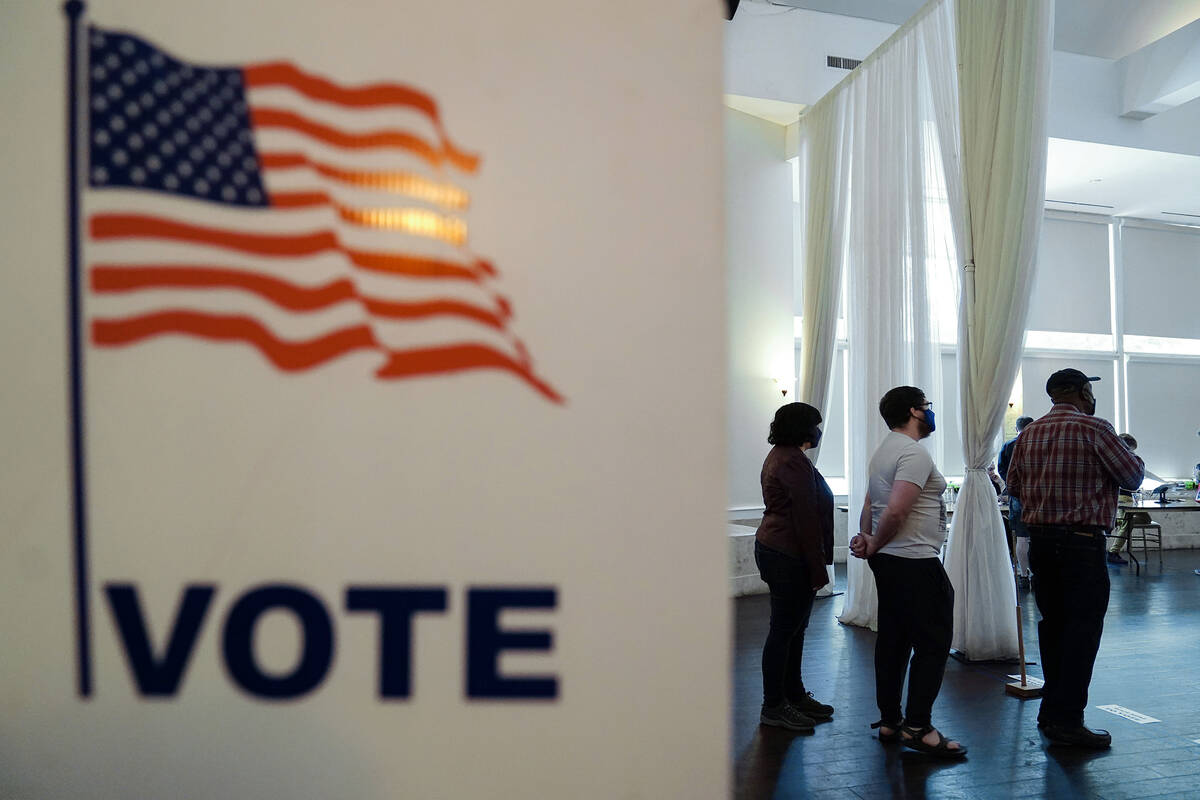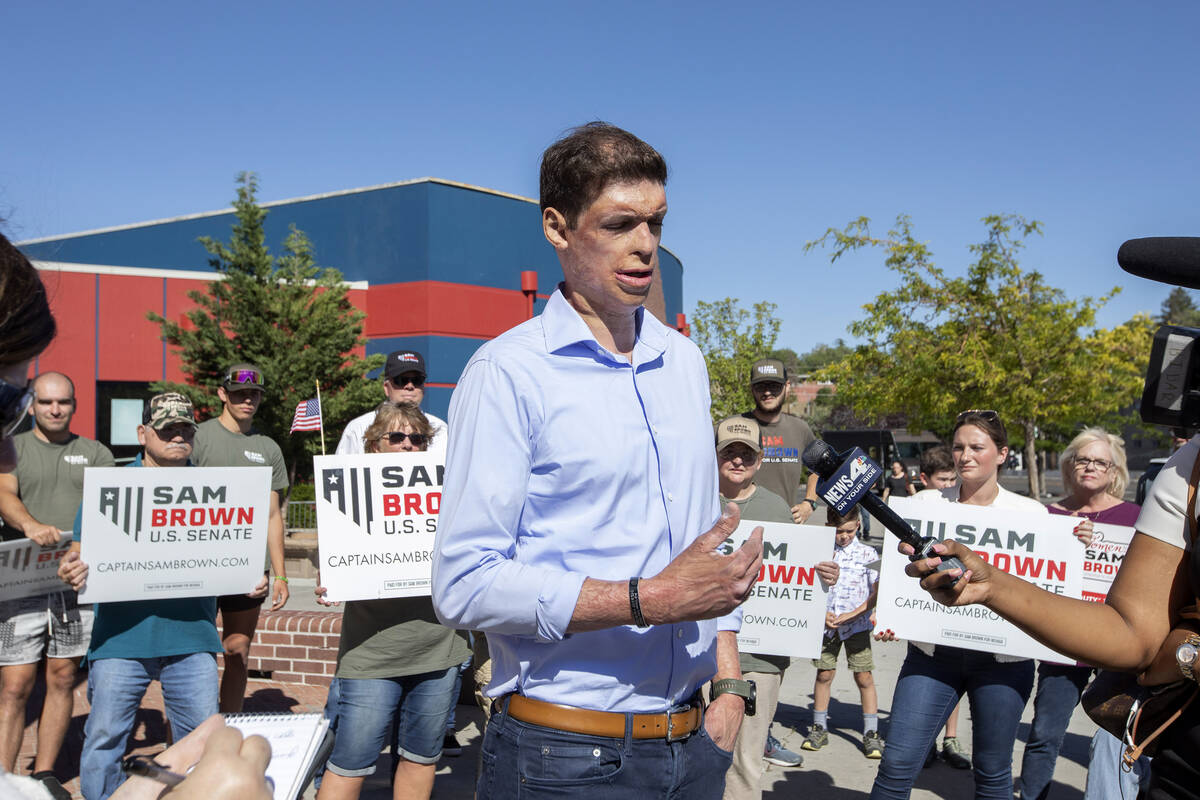5 fundraising takeaways as Nevada candidates gear up for 2024 races
Nevada candidates running for federal office have been busy raising funds for their campaigns, which are getting more expensive as both the June primary and the November general election draw near.
Federal candidatesrecently filed their year-end fundraising reports, which can indicate how a candidate is doing on the campaign trail and to whom they are appealing.
The reports can sometimes signify who is “leading” in the race, although dark horses can pull through and finish first at the polls, since the candidate with the biggest pockets aren’t always the ones that win voters’ support.
The Review-Journal reviewed the campaign finance reports for the Senate and each of Nevada’s U.S. House races, as well as the state party’s federal financial statuses. Here’s what stood out to them.
1. The Senate race is gaining traction
Nevada Democratic Sen. Jacky Rosen, who faces a tough re-election bid amid a crowded field of Republican candidates, raised about $3.2 million last quarter and has a stockpile of more than $10.6 million, which is more than any other incumbent Nevada senator has had at this point in their re-election bid, according to her campaign.
More than 19,000 donors contributed to her campaign in the fourth quarter, and the average online donation was $27, according to her campaign.
“Nevada is once again a top battleground state this cycle, and we are building the strong grassroots campaign needed to share Jacky Rosen’s record as one of the most bipartisan and effective Senators delivering for our state,” said Stewart Boss, Rosen’s campaign manager, in a statement.
Meanwhile, in the Republican primary field, Sam Brown, who has received the backing of Republican leaders in Washington D.C., is ahead of the others with $1.85 million raised in the last quarter and has about $1.7 million cash on hand.
“I’m extremely grateful that tens of thousands of everyday Americans have dug deep and contributed to this campaign,” Brown said in a statement. “Every day, as we travel throughout Nevada and speak with voters, I’m reminded of why this race is so critical to the future of our state.”
Dr. Jeff Gunter raised $215,000 and reported nearly $29,000 on hand at the close of the reporting period, and Jim Marchant reported $160,000 raised with $58,000 on hand. Tony Grady raised $36,000 and has $57,000 on hand, and Stephanie Phillips raised $11,000 and reported $8,000 on hand.
2. Democratic incumbents outraising Republican opponents
Democratic Rep. Susie Lee reported raising nearly $700,000 in the last quarter and had nearly $1.6 million. Her Republican opponents, one of whom must win the June primary to proceed to the November election, reported lower numbers. Elizabeth Helgelien raised $50,000 and has $66,000 on hand, and Drew Johnson raised nearly $14,000 and reported $57,000 on hand.
Dan Schwartz, who recently announced his Republican run for Congress in Lee’s district, did not have a financial report.
Democratic Rep. Dina Titus reported raising $237,000 and having $638,000 on hand. Flemming Larsen, one of her Republican opponents, raised $499,000 and has $1.3 million on hand. Larsen loaned himself $1.25 million to himself and an additional $400,000 in last quarter. Her other opponents, Mark Robertson, and Michael Boris, each raised $6,535 and $25,000 respectively, and have $92,000 and $234 cash on hand.
In Nevada’s 4th Congressional District, Democratic Rep. Steven Horsford raised $600,000 in the last quarter and has $1.5 million on hand, although he has $65,000 in debt. Republican candidate David Flippo reported $407,000 raised, $367,000 on hand and $2,500 in debt. John Lee raised $122,000, has $116,000 on hand and $21,700 in debt.
Nevada’s lone Republican congressman, Rep. Mark Amodei, is currently running unopposed. He raised $140,000 and has $411,000 on hand.
3. Candidates’ campaigns in debt
According to their year-end reports, many candidates have reported debt their committees owe.
Brown’s committee owes almost $600,000 in debt. His campaign did not return the Review-Journal’s request for comment. Gunter has about $225,000 in debt, and Rosen has $15,000 in debt.
4. Political parties coffers funds
The Nevada Republican Central Committee raised $517,000 funds and reported $511,000 on the hand at the close of the reporting period. The committee also owed $37,000 in debt.
Vivek Ramaswamy, Donald Trump, Doug Burgum, Ryan Binkley, Chris Christie and Ron DeSantis each gave $55,000 to participate in the party-run caucus, giving the party a total of $330,000, although only Trump and Binkley remain.
The Nevada State Democratic Party raised $185,000 and reported $170,000 cash on hand.
5. Big donors coming from Nevada
Stephen Wynn, founder and former chairman of Wynn Resorts, has donated significant sums to the Republican efforts. In November 2023, he donated $123,900 to Republican National Committee
Working for Working Americans, a PAC based in Las Vegas in the building trade union industry, donated $100,000 in November to the Defending America PAC, which is focused on helping Rep. Brian Fitzpatrick, R-Penn., win his re-election.
Marc Falcone, founder of MF Ventures and former CFO of Station Casinos, donated $15,000 in October to the Kentucky State Democratic Central Executive Committee.
An previous version of this story misstated how much money Lee raised.
Contact Jessica Hill at jehill@reviewjournal.com. Follow @jess_hillyeah on X.























